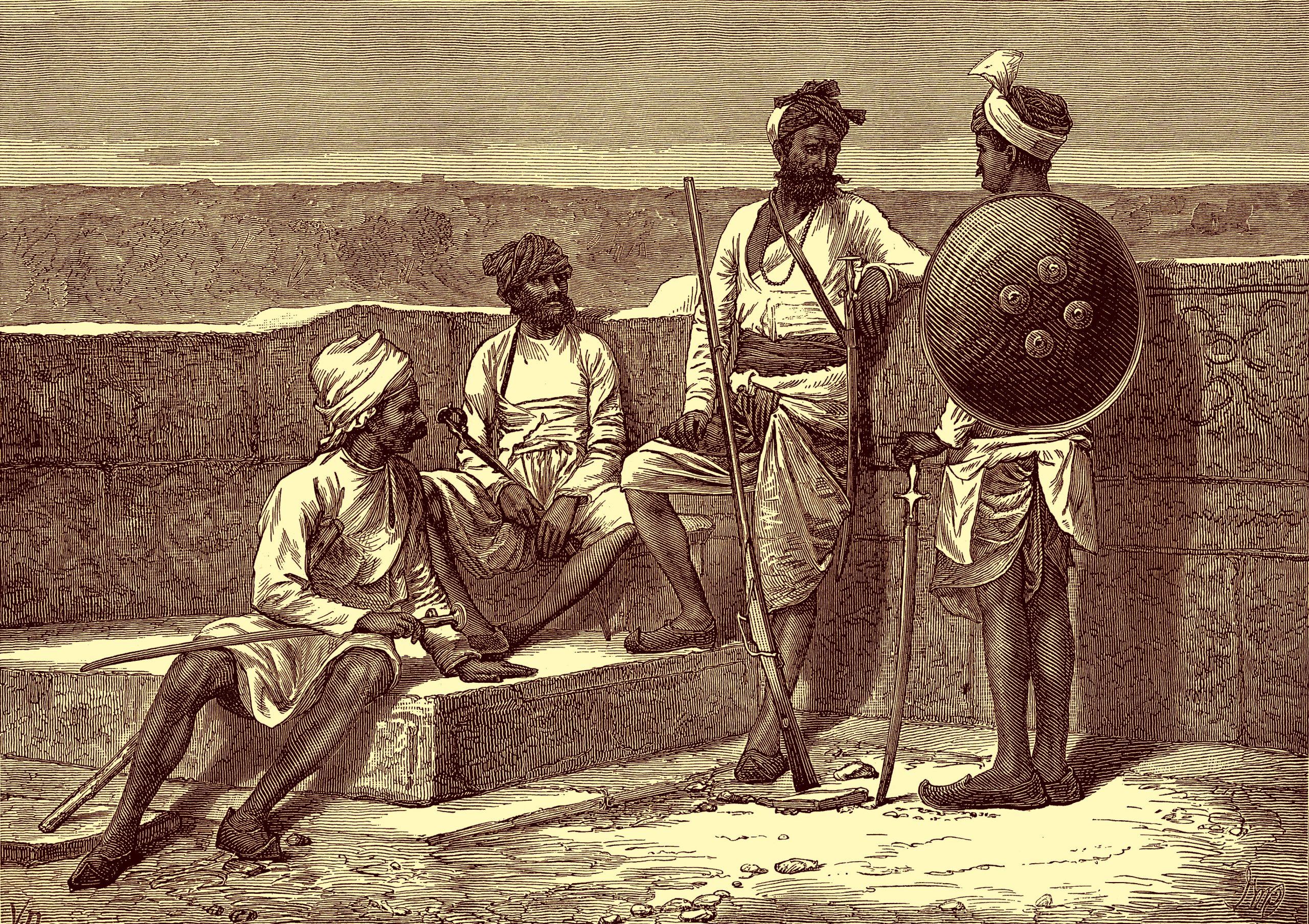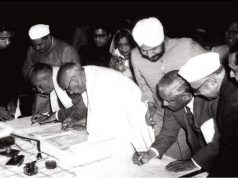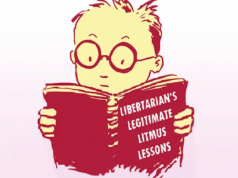The following article, written by DM Kulkarni, first appeared in the March 1960 issue of The Indian Libertarian. Mr Kulkarni argues that if India wants to be on the path to a free and open society, the caste system must go. He calls for the educated people to bring about an intellectual and cultural revolution in the country by propagating vigorously rational ideas about caste and exposing its evils on rational grounds, and at the same time by stoutly refusing to countenance casteism and its mythical taboos and restrictions in any shape and form.
It is generally agreed among the thinking sections of the Indian population, that the caste system in the form in which it prevails among the Hindus today, is the greatest curse of India, and has proved to be a big stumbling block in the path of India’s all-round progress. It is within the common experience of the administrators and public workers, that all welfare schemes undertaken by the Government, or social organisations, flounder on the rock of casteism which permeates inevitably, though imperceptibly, the very machinery set up to implement them. It is, therefore, that an urgent duty is cast on all well-Wishers of our country to apply themselves seriously to the task of speedily eradicating caste, which is sapping all strength out of our national life, and has become, in the words of Prof Sir Fredrick Bartlett ‘one of the hard points of Hindu culture.’ (quoted in “Caste and Race in India” by Prof Ghurye).
Evolution of Caste
All Orientalists and sociologists agree that this caste system, at least in its original, form resembled in material particulars, the class, or better still the ‘estates’ system that prevailed in both Eastern and Western countries in ancient times. Regarding Indian Social Organisation during the early Vedic period, Prof Max Muller observes in “Chips from German Workshop”: – “There is no authority in the hymns of the Vedas for the present complicated caste system, at least in its original form claimed by the Brahmins and for the degraded position of the Shudras; there is no text to show that there was any bar to eating and drinking together, inter-dining and inter-caste marriage.” He then concludes that “a Hindu who believed only in the Vedas could be much nearer to Christianity than those who follow Puranas and Tantras.” Swami Dayanand Saraswati, the great founder of the Arya Samaj movement and Vedic scholar also supports this view that caste system as such, with its extreme rigidity and exclusiveness, did not exist among the Vedic Aryans. It is thus clear that the present framework of caste-based on birth and hereditary occupations was slowly evolved in all its ugly features of irrational taboos and restrictions on food, social contacts and marriages, culminating in the most monstrous institution of untouchability, during the Puranic period ending with the 11th century A.D., when India divided vertically and horizontally by innumerable caste and sub-castes, fell an easy prey to the foreign invasions of the Northern hordes.
Major Operation Essential
This institution of caste and unlimited number of sub-castes, each one imbued with the spirit of exclusiveness, superiority and inferiority complexes, with its exploded ideas of racial and ceremonial purity, ill-conceived and unfounded prejudices with respect to other castes, have brought about a complete disruption of Indian national life and has created unnecessary strifes, dissensions in our body politic. It had made it very difficult, if not impossible, for the Indian nation as a whole, to pursue any scheme of social, economic welfare with a united effort and will and with a singleness of purpose and devotion. The code of relative moral and social behaviours, the different sets of judicial principles, framed and applied by the Hindu law-givers like Manu and others, for different caste and strata of society have led to the formation of distinct ethical and social groups, widely differing from one another in patterns of social behaviour and moral values. All this differentiation, deliberately made by the law-givers, has tended to create isolationism, cliquism as between castes, in practically all walks of life. The non-Brahmin movements in Maharashtra and in South India can all be traced to this same evil of casteism, which, despite the legislative laws of the Government in this respect, is still stalking abroad in all its strength and fury. The high and the low, the King and the peasant, the Minister and the peon, the Indian National Congress and Village Panchayat have all to humble themselves before the Almighty power of caste. It is a patent fact, that caste considerations to a great extent determine the choice of even the Congress candidates in the General Election and also in the Elections of the local bodies. Ministers and Government Administrators, even while profusely mouthing high sounding phrases and slogans of strong denunciation of caste, have perforce to attend, guide, and preside over caste functions and thus directly encourage casteism, just to be in the good books of the caste-leaders at the time of the Elections. These castes and sub-castes, whenever they have to come together, out of daily life’s urgent needs and necessities do so, not out of a healthy spirit of camaraderie and social co-operation, but ”mechanically” as Dr Ambedkar has well put it. The same writer further says in his book ”What Gandhi and Congress have done for the untouchables” that the caste system is not only “non-social but also anti-social”. And as such, this institution calls for strenuous efforts on the part of all interested in the welfare of the country, to root it out completely and not merely be satisfied with make-shift arrangements which will not solve the problems.
Economic Consequences of the Caste System
Caste, besides being an obstacle to social and national unity has now proved to be a hindrance to our economic progress as well. The rigidity of caste with its professions and trades assigned to particular castes has killed the initiative and enterprise of the people. Free mobility of labour, free choice of profession and division of labour which is quite essential for stepping-up production under modern industrial conditions are totally absent under this institution. This has resulted in a colossal waste of human talents and potentialities. Besides, caste has fostered among the higher classes, a feeling of utter contempt for manual work which is inimical to the economic progress of the people. The specious argument that the caste alone preserves hereditary skills in handicrafts and arts, falls to the ground when we see such skills being handed down from father to son even in social groups and communities which do not observe caste. The degradation of sixty millions of untouchables to a position worse than that of slaves under the caste system has entailed on our country huge economic and social loss.
On to a Free and Open Society
Thus considered from any point of view, rational, economic, social, political, and even historical caste system is the greatest evil the country is suffering from today and has therefore got to go. Too long have we tolerated it in our midst. Any more tinkering with the problem is fraught with grave danger to our very national existence. The caste-ridden society is a “closed” society, perhaps suited to the conditions of a by-gone age. But in modern “open and democratic” society which it is our aim to build up, it has no place. In the words of our Prime Minister Nehru – “there can be no equality of status and opportunity within its framework, nor can there be political democracy and much less economic democracy. Between these two conceptions, conflict is inherent. Only one of them can survive” (J. Nehru, ‘Discovery of India’). It is, therefore, up to the educated people to bring about an intellectual and cultural revolution in the country by propagating vigorously rational ideas about caste and exposing its evils on rational grounds and at the same time by stoutly refusing to countenance casteism and its mythical taboos and restrictions in any shape and form. This revolutionary work among the people coupled with political pressures exerted by the Government in a democratic way, on this institution of caste, will surely hasten its death.
The original document can be accessed here.
IndianLiberals.in is an online library of all Indian liberal writings, lectures and other materials in English and other Indian regional languages. The material that has been collected so far contains liberal commentary dating from the early 19th century till the present. The portal helps preserve an often unknown but very rich Indian liberal tradition and explain the relevance of the writings in today’s context.
Post Disclaimer
The opinions expressed in this essay are those of the authors. They do not purport to reflect the opinions or views of CCS.






